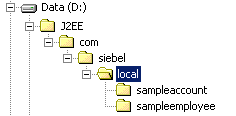About the Code Generated for an Integration Object
Integration objects are special kinds of property sets that are the input and output of business services based on the data sync service. JavaBeans based on integration objects are designed to be used with those business services or with the EAI Siebel Adapter and can be used to query, delete, upsert, and synchronize information in the Siebel Server's database.
The integration object, and each of its components, has its own
Java class, stored in the package com.siebel.local.IntegrationObjectName. The class for the integration object has IO appended to the end,
and the class for an integration component has IC appended. The Code
Generator creates the standard Java directory structure reflecting
the package structure. In the selected folder, a subfolder named com is created, containing a subfolder siebel, containing a subfolder local, which contains one
subfolder for each integration object that was generated. The Java
files are stored in the lowest directory. This structure is shown
in the following image. One folder is created under local for each integration object that is generated. The folder that is
created contains all the Java files for that integration object.

For example, the integration object Sample Account; which has five components Account, Account Attachment, Account_Organization, Business Address, and Contact; generates the following six classes:
Sample_AcccountIO
AccountIC
Account_AttachmentIC
Account_OrganizationIC
Business_AddressIC
ContactIC
The first class, suffixed with IO, represents the entire integration object. It has methods to construct the object, to read and write fields, to add integration object components, and to convert to and from a SiebelPropertySet. The other five classes, suffixed with IC, represent the individual integration object components and provide methods that are for constructing the component to read and write fields and to convert to and from a SiebelPropertySet.